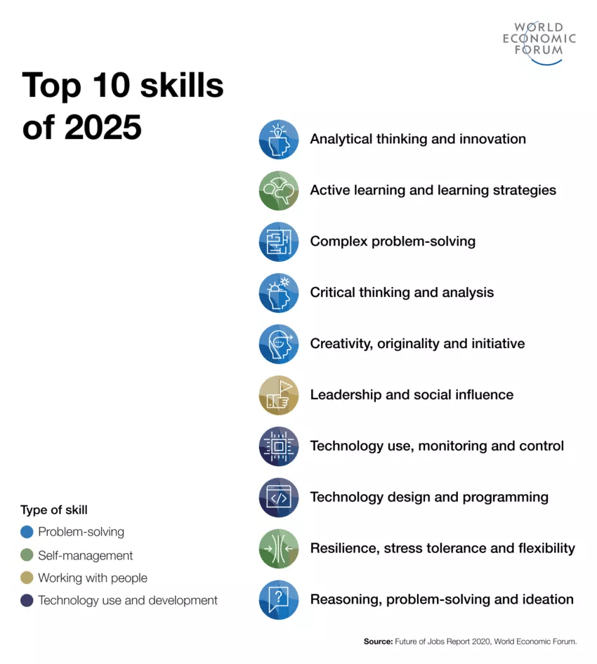
Thought Leadership
Procurement Skills of the Future | Fresh research perspective from WEF

Lari Numminen • Dec 10, 2020
The World Economic Forum recently released their Future of Jobs Report. We looked at the report from the point of view procurement and reflected on what the trends it highlighted will mean for careers in procurement.
It’s not surprising that routine job roles such as data entry clerk, buyer and bookkeeper are expected to continue their decline. There will be an increasing demand for data analysts, artificial intelligence and digital automation specialists, across all industries. This has important implications for the procurement function and its traditional job roles. Some of the new skills required will be in short supply. Companies must address issues such as re-training, staff retention, re-allocation of job content and investing in hiring people with specialized skills.Alongside this, the trend for remote working will continue. People will need to enhance their interpersonal skills and communication abilities to enable them to overcome challenges such as working in teams and time discipline.
Reviewing the Top 10 skills for 2025, as identified in the WEF Report, we see that many of these are conceptual and require judgmental ability. Some of these non-technical skills have been identified previously, it’s the emphasis on logical thinking, applying new technologies, and self-management that are now highlighted.

What does this mean for procurement?
Problem-solving and analytical thinking
Here are some of the increasingly important soft skills for procurement in the coming years:
- Analytical thinking and innovation
- Complex problem solving
- Critical thinking and analysis
- Reasoning, problem solving and ideation
- Creativity, originality and initiative
Problem-solving starts with gathering all the relevant facts and figures, validating them and examining (i.e. analysing) the individual pieces of data to identify the key issues. Complex problems may need to be sub-divided into sub-problems or smaller sizes where it may be necessary to study both cause and effect. Logical thought is then applied to the problem area; identify potential solutions, prioritize them and decide on the preferred actions. Creativity, originality and taking the initiative are driven by both information and logical thought.
Complex procurement categories such as software, cloud-based services, mobile communications, and smart devices are becoming increasingly inter-related and require clear thinking and reasoning, based on reliable data. Continuous improvement initiatives and opportunities for innovation will emerge from a robust data gathering and analysis process. Critical thinking can be applied effectively to procurement processes such as contract management and strategic sourcing, both of which are often criticized for being too complicated, lengthy, and expensive.
Leadership and social initiative
Leadership involves seeing the big picture and taking a more open, focused and integrated view of the overall business. This has been identified as one of the main skills gaps in procurement today. Procurement professionals need to develop their curiosity about the external economic and social environment so that they can make a meaningful contribution to business strategy. On a practical level, this means having more than a basic understanding of international finance and economics as well as embracing sustainability initiatives.
The application of new technologies to procurement
The rate of adoption of software solutions in procurement is accelerating. Cloud computing is a game-changer. Software solutions that can deal effectively with “big data” provide reliable and actionable information. Other growth areas are the inter-connectedness of devices and the urgent focus on cybersecurity and encryption.
Procurement roles in 2025 will demand expertise in the application of these technologies, some of these are only in their infancy today. Traditional areas such as contracting and risk management that require monitoring and control will not be excluded from this trend. Developing new skills will not be optional.

WEF Future of Jobs Report 2020
There are identified barriers to the wide adoption of more complex technology solutions. These are the continuing skills shortage in technical roles, including design and programming of software solutions. The WEF Report also highlights corporate challenges such as skills gaps in leadership roles and the inability of companies to attract new talent. The procurement function is not exempt from these issues.
Re-training and on-going learning
The WEF Report notes that the window of opportunity to re-skill staff has become shorter in the newly constrained labour market. 40% - 50% of the core skills in most jobs will change within the next five years. In practice, this means that opportunities for e-learning and structured skills training will be provided both in-house and through external bodies such as ISM and CIPS. Roles that involve transactional buying will continue to be replaced by those that support e-catalogue management and e-sourcing.
The Top skills list of 2025 is completed with areas of self-management and personal traits which include being tolerant and flexible when working with others, building resilience and managing our stress levels. The year 2020 to date has provided lessons in every one of these areas which helps us prepare for the new reality of 2025.
Open Positions
Welcome to explore our open job opportunities around the world
- Position
- Location
- Apply Before

